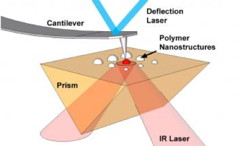Home > Press > University of Illinois researchers develop novel technique for chemical identification at the nanometer scale
 |
| Atomic force microscope infrared spectroscopy (AFM-IR) of polymer nanostructures. |
Abstract:
For more than 20 years, researchers have been using atomic force microscopy (AFM) to measure and characterize materials at the nanometer scale. However AFM-based measurements of chemistry and chemical properties of materials were generally not possible, until now.
University of Illinois researchers develop novel technique for chemical identification at the nanometer scale
Urbana, IL | Posted on March 9th, 2013Researchers at the University Illinois report that they have measured the chemical properties of polymer nanostructures as small as 15 nm, using a novel technique called atomic force microscope infrared spectroscopy (AFM-IR). The article, "Atomic force microscope infrared spectroscopy on 15nm scale polymer nanostructures," appears in the Review of Scientific Instruments 84, published by the American Institute of Physics.
"AFM-IR is a new technique for measuring infrared absorption at the nanometer scale," explained William P. King, an Abel Bliss Professor in the Department of Mechanical Science and Engineering at Illinois. "The first AFM-based measurements could measure the size and shape of nanometer-scale structures. Over the years, researchers improved AFM to measure mechanical properties and electrical properties on the nanometer scale.
"These infrared absorption properties provide information about chemical bonding in a material sample, and these infrared absorption properties can be used to identify the material," added King, who is also the director of the National Science Foundation (NSF) Center for Nanoscale Chemical-Electrical-Mechanical Manufacturing Systems at Illinois. "The polymer nanostructures are about an order of magnitude smaller than those measured previously."
The research is enabled by a new way to analyze the way the nanometer-scale dynamics within the AFM-IR system. The researchers analyzed the AFM-IR dynamics using a wavelet transform, which organizes the AFM-IR signals that vary in both time and in frequency. By separating the time and frequency components, the researchers were able to improve the signal to noise within AFM-IR and to thereby measure significantly smaller samples than previously possible.
The ability to measure the chemical composition of polymer nanostructures is important for a variety of applications, including semiconductors, composite materials, and medical diagnostics.
The authors on the research are Jonathan Felts, Hanna Cho, Min-Feng Yu, Lawrence Bergman, Alex Vakkakis, and William P. King. The article is available online.
####
For more information, please click here
Contacts:
William P. King
Department of Mechanical Science and Engineering
College of Engineering
University of Illinois at Urbana-Champaign
217-244-3864
Copyright © University of Illinois College of Engineering
If you have a comment, please Contact us.Issuers of news releases, not 7th Wave, Inc. or Nanotechnology Now, are solely responsible for the accuracy of the content.
| Related Links |
| Related News Press |
News and information
![]() Researchers develop molecular qubits that communicate at telecom frequencies October 3rd, 2025
Researchers develop molecular qubits that communicate at telecom frequencies October 3rd, 2025
![]() Next-generation quantum communication October 3rd, 2025
Next-generation quantum communication October 3rd, 2025
![]() "Nanoreactor" cage uses visible light for catalytic and ultra-selective cross-cycloadditions October 3rd, 2025
"Nanoreactor" cage uses visible light for catalytic and ultra-selective cross-cycloadditions October 3rd, 2025
![]() Researchers tackle the memory bottleneck stalling quantum computing October 3rd, 2025
Researchers tackle the memory bottleneck stalling quantum computing October 3rd, 2025
Chemistry
![]() "Nanoreactor" cage uses visible light for catalytic and ultra-selective cross-cycloadditions October 3rd, 2025
"Nanoreactor" cage uses visible light for catalytic and ultra-selective cross-cycloadditions October 3rd, 2025
![]() Cambridge chemists discover simple way to build bigger molecules – one carbon at a time June 6th, 2025
Cambridge chemists discover simple way to build bigger molecules – one carbon at a time June 6th, 2025
Discoveries
![]() Researchers develop molecular qubits that communicate at telecom frequencies October 3rd, 2025
Researchers develop molecular qubits that communicate at telecom frequencies October 3rd, 2025
![]() Next-generation quantum communication October 3rd, 2025
Next-generation quantum communication October 3rd, 2025
![]() "Nanoreactor" cage uses visible light for catalytic and ultra-selective cross-cycloadditions October 3rd, 2025
"Nanoreactor" cage uses visible light for catalytic and ultra-selective cross-cycloadditions October 3rd, 2025
Announcements
![]() Rice membrane extracts lithium from brines with greater speed, less waste October 3rd, 2025
Rice membrane extracts lithium from brines with greater speed, less waste October 3rd, 2025
![]() Researchers develop molecular qubits that communicate at telecom frequencies October 3rd, 2025
Researchers develop molecular qubits that communicate at telecom frequencies October 3rd, 2025
![]() Next-generation quantum communication October 3rd, 2025
Next-generation quantum communication October 3rd, 2025
![]() "Nanoreactor" cage uses visible light for catalytic and ultra-selective cross-cycloadditions October 3rd, 2025
"Nanoreactor" cage uses visible light for catalytic and ultra-selective cross-cycloadditions October 3rd, 2025
Tools
![]() Japan launches fully domestically produced quantum computer: Expo visitors to experience quantum computing firsthand August 8th, 2025
Japan launches fully domestically produced quantum computer: Expo visitors to experience quantum computing firsthand August 8th, 2025
![]() Rice researchers harness gravity to create low-cost device for rapid cell analysis February 28th, 2025
Rice researchers harness gravity to create low-cost device for rapid cell analysis February 28th, 2025
|
|
||
|
|
||
| The latest news from around the world, FREE | ||
|
|
||
|
|
||
| Premium Products | ||
|
|
||
|
Only the news you want to read!
Learn More |
||
|
|
||
|
Full-service, expert consulting
Learn More |
||
|
|
||








